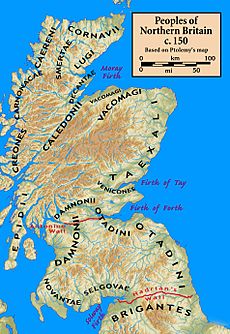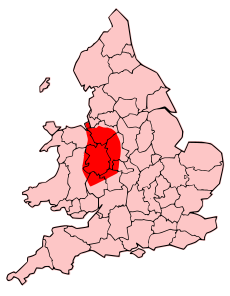Cornovii facts for kids
The Cornovii were ancient tribes who lived in Britain a long time ago, during the Roman times. We know about them from old maps and writings. There were probably two or even three different groups of Cornovii. One lived in what is now Shropshire in the middle of England. Another lived far north in Caithness, Scotland. And a third group might have lived in Cornwall in the southwest of England. Their name appeared in different ways in old texts, like Cornavii or Curnavii.
Contents
Who Were the Cornovii Tribes?
Historians believe there were a few main groups of Cornovii:
The Midlands Cornovii
This group lived in the area we now call Shropshire, in the middle of England. An ancient writer named Ptolemy wrote about them in his book Geography around 200 AD. He mentioned two of their important towns. One was Deva Victrix, which is now Chester. Their main town was Viroconium Cornoviorum, known today as Wroxeter. This was their capital city and was probably the fourth largest Roman settlement in Britain.
The Caithness Cornovii
This tribe lived at the very northern tip of Britain, in what is now Caithness, Scotland. We only know about this group from Ptolemy's Geography.
The Cornwall Cornovii
This group might have been a part of a larger tribe called the Dumnonii in southwest Britain. Ptolemy didn't mention them directly. However, their existence is suggested by an old place-name found in a text from around 700 AD. This name, purocoronavis, is thought to be a mistake for durocornavis. This means "the fortress of the Cornovii".
What Does the Name "Cornovii" Mean?
The exact meaning of the name "Cornovii" isn't fully clear. Many experts agree that the word *corn means "horn". But they disagree on whether this refers to the shape of the land.
Land Shape Theory
For the Cornovii in Cornwall, the name might come from the shape of the land. Cornwall is a long, narrow piece of land that sticks out into the sea, like a horn. So, some scholars think "Cornovii" could mean "the people of the horn".
Horned God Theory
Another idea is that the name might be linked to a "horned god" cult. This means the tribes might have worshipped a god with horns. This theory suggests the name could be connected to ancient religious practices. For example, the Abbots Bromley Horn Dance, a very old pagan ritual, still exists today. Abbot's Bromley is not far from the Midlands Cornovii's capital, Viroconium. This makes some wonder if there's a link.
The land shape idea doesn't really explain the name for the Caithness tribe or the Midlands tribe, as their lands aren't shaped like horns. This makes the "horned god" theory more interesting for all three groups.
Was There a Connection Between the Tribes?
A historian named John Morris suggested a theory in 1973. He thought that some Cornovii from the Midlands might have moved to Cornwall in the 400s AD. He believed they went there to rule the land and protect it from invaders.
However, most modern historians and archaeologists don't agree with Morris's theory. They believe that the Cornovii in Cornwall were a local people. They were likely separate from the Cornovii in the Midlands and Caithness.



